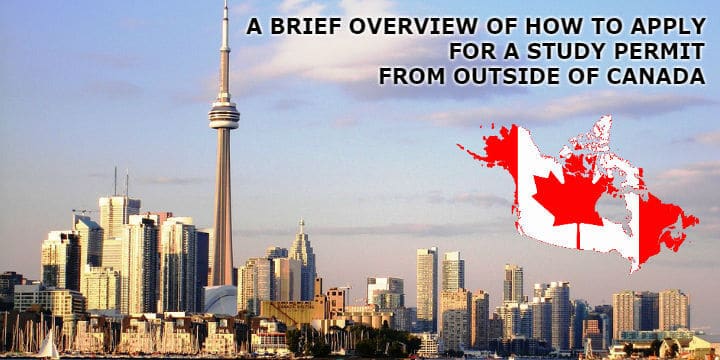This article will briefly review what is required to apply for a study permit from outside of Canada. We remind the reader that this does not necessarily apply to everyone seeing that the Canadian Immigration Law is complex and therefore this article should not be construed as Legal Advice.
In the Canadian Immigration Law context, a study permit is defined at R. 2 of the Immigration and Refugee Protection Regulations, hereafter the Regulations, as “a written authorization to engage in academic, professional, vocational or other education or training in Canada that is issued by an officer to a foreign national. In General, a foreign national who wishes to study in Canada must obtain a study permit before entering Canada pursuant to R. 213 of the Regulations. There are some exemptions that allow some foreign nationals to apply at a Port of Entry or after entry into Canada. Some foreign nationals are even exempt from applying for a study permit such is the case ” if the duration of their course or program of studies is six months or less and will be completed within the period for their stay authorized upon entry into Canada” pursuant to R. 188 (1) (c) of the Regulations.
This article will address foreign nationals who want to apply outside of Canada for a study permit. Pursuant to R. 216 (1) of The Regulations, an international student may be issued a study permit if upon examination by an officer it is determined that the foreign national meets the requirements of a temporary resident application as well as the requirements set out for a study permit.
A visa officer considers many factors when assessing whether or not a foreign national should be issued a study permit. At a minimum a foreign national must demonstrate five things:
- That they have been accepted in a designated learning institution by presenting a letter of acceptance from the institution unless they are exempt pursuant to R 219 (2) (a) of The Regulations.
- That they will have the financial capacity to pay their tuition as well as cover their living expenses while in Canada.
- That their intention to study in Canada is genuine (bona fides).
- That they are not inadmissible into Canada.
Despite meeting these requirements an officer might still determine that you do not meet the requirements pursuant to section 219 and 220 of the Regulations or that you will not leave Canada upon the expiry of your status therefore it is important to demonstrate all the requirements for a temporary residence application such as your travel history (although an absence of travel history is a neutral factor), ties to the home country and Canada as well as the general requirements for a study permit.
Applicants must also ensure they meet the documentation and form requirements of the Visa Office of their country of residence which can be found here by selecting the country from which the applicant is applying form.
We have thus seen that applying for a study permit can be quite complex in some circumstances. If you would like to come and study in Canada and are uncertain as to how to proceed contact the Chaudhary Law Office, a Toronto Immigration Law Office specializing in Canadian Immigration Law.

